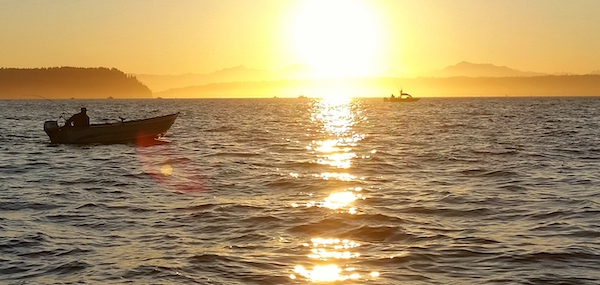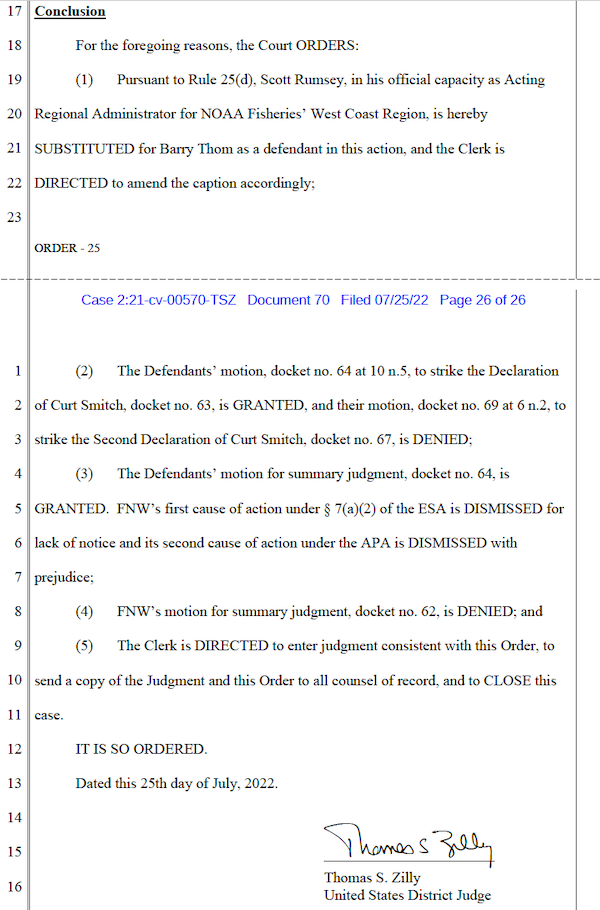
Judge Dismisses Fish NW’s Puget Sound Chinook Lawsuit
A federal judge in Seattle has dealt another blow to an Anacortes-based fishing organization’s lawsuit challenging authorization of recent Puget Sound Chinook seasons.
US District Court Judge Thomas S. Zilly yesterday dismissed Fish Northwest‘s arguments that the National Marine Fisheries Service had failed to protect the Endangered Species Act-listed population in its 2021 biological opinion OKing that season’s fisheries and that it had represented a violation of the Administrative Procedure Act.

In abiding by NMFS’s work overseeing take of listed salmon and granting the agency’s motion for summary judgment, the judge closed the case without hearing oral arguments, though it still could be appealed.
“We will find common ground not in the courtroom but in the rivers, streams and nearshore habitat essential to the mutual goals of sustainable fisheries and recovered salmon,” said Michael Milstein, a NMFS spokesman for the West Coast region. “Communities are collaborating on innovative ways to protect habitat in watersheds such as the Dungeness, Stillaguamish, and Green River. They are seeing success, but we have a lot more work to do, and must do it together.”
Fish Northwest’s Brett Rosson had no immediate comment except to say that his organization was “conferring” with its attorneys and would have a statement later in the week.
FNW – comprised of influential people and businesses in Washington’s salmon fishing world – can take away that they, in Judge Zilly’s words, at least “demonstrated standing to sue on behalf of its members,” that the arguments of member anglers Barry Allyn, Art Tachell and Curt Smitch were strong enough for a judge to establish they were suffering injury from declining king salmon runs, and even as FNW went after federal justifications for seasons that were already ongoing, their case was not moot because of how NMFS was likely in the near term to continue authorizing annual fisheries in the same manner.
That said, Zilly ruled that three of FNW’s primary claims – that NMFS’ 2021 biop OKed harvest of listed Chinook at rates that jeopardized the population, failed to coordinate that season’s fishing plan with hatchery genetic management plans and didn’t consider the risk of authorizing fisheries on a year-by-year basis – lacked merit.
FNW had argued that the rebuilding exploitation rates – basically, how many salmon can be removed in fisheries without threatening a run’s existence – were being exceeded by the biop, but Zilly pointed out that RER is just one of numerous tools NMFS uses to set harvest limits for various runs and in the end the organization’s contention that federal overseers were misusing or misapplying the benchmarks were “not supported by the record.”
He was specifically puzzled how FNW could say that Duwamish-Green River Chinook were being harvested at 221 percent of RER when NMFS’ biop estimated ocean and Puget Sound take would come in at 54.7 percent.
Similarly, the record also “reflects a careful analysis of the effects of hatchery-origin fish on the Puget Sound Chinook (evolutionary significant unit),” he wrote.
And Zilly essentially demurred to NMFS’s professional assessment of the stock and proposed fisheries, saying the agency “provided reasonable explanations supporting its conclusions in this highly technical and complex area. Without more, the Court will not second-guess NMFS’s scientific judgment that the proposed actions it considered in the 2021 BiOp were unlikely to reduce appreciably the likelihood of both the survival and recovery of the listed species it analyzed in the opinion.”
The judge ordered the case closed as of yesterday.

In a lawsuit marked by the filing of several amended complaints and always considered to be an “uphill climb” for FNW, Zilly previously ruled in October 2021 that the organization’s challenge of the 2020 season’s biop was moot as it had been superseded by the 2021 authorization, but said he would entertain arguments around last year’s biop, which were ruled on yesterday. At the time, Rosson had seen that as a positive takeaway.
Since the expiration of the previous longterm Puget Sound Chinook management plan in the early 2010s, NMFS has been approving WDFW and tribal salmon seasons on a year-to-year basis. A new 10-year plan was submitted for federal approval this February.
Fish Northwest’s lawsuit is one of two born out of discontent over sharply diminished Chinook seasons in the San Juan Islands in recent years, from as much as seven months of fishing opportunity as recently as six years ago to all of seven days last season (and it could have been as few as three if not for a federal holiday).
There’s also anger over the structure of North of Falcon – the process for setting fisheries in Washington – that piggybacks WDFW’s salmon permit on the tribes’ application to the feds, weakening the state’s position, FNW feels.
This lawsuit was couched in conservation, but FNW’s other suit, filed in October 2020, asks to intervene in the Boldt Decision as a means to address ongoing state-tribal Chinook and coho catch disparities in favor of the latter fishers. There apparently hasn’t been any developments on that front, federal court records will show.

